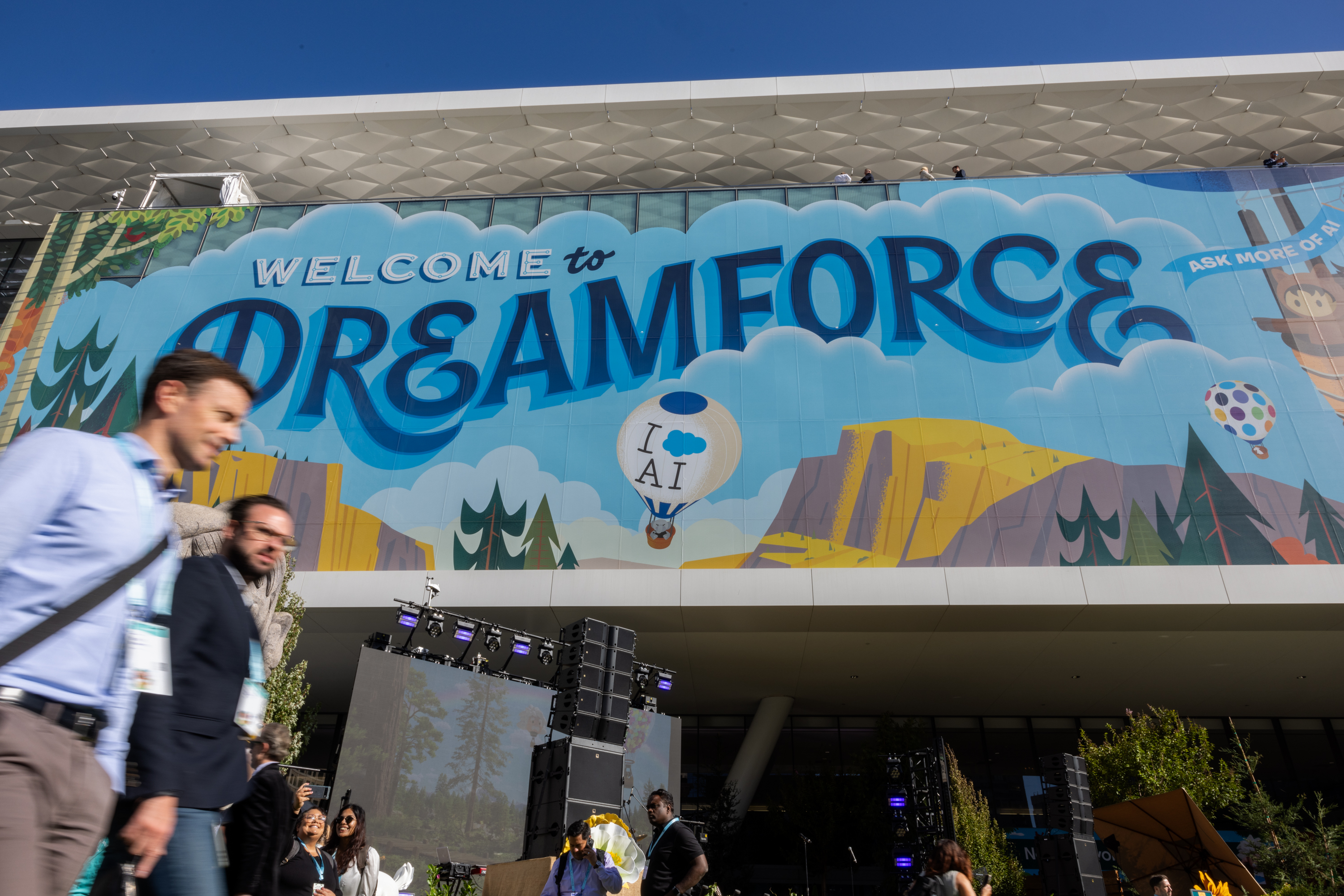For first-timers, Dreamforce, the flagship conference for tech behemoth Salesforce, can be anxiety-inducing, a torrent of people descending onto Moscone Center in Downtown San Francisco for an overload of celebrities, music, AI and company paraphernalia—and a few seminars and workshops thrown in for good measure.
This year, as anxiety about San Francisco’s public safety and the possibility of a “doom loop” come to a fever pitch in the media, there’s perhaps another worry for Salesforce, and San Francisco at large.
In the weeks leading up to the conference, Salesforce CEO Marc Benioff, a longtime San Francisco booster, threatened to pull the event from the city going forward if this year’s iteration “is impacted by the current situation with homelessness and drug use.” Around 40,000 attendees are estimated to make it this year—about a fifth of the attendance at the event a decade ago.
To some chagrin among fellow members of the tech elite, Benioff has long been an advocate for San Francisco, pouring money into University of California San Francisco hospitals and public schools and advocating for Proposition C in 2018, which taxed the city’s largest businesses to fund programs for homeless people. He capped off last year’s Dreamforce by boasting that there were no “safety incidents” connected to the event.
Benioff publicly professing concerns about the dangers of San Francisco is something of a change for the prominent executive. On Tuesday, he urged attendees to “have a safe time” at Dreamforce, one reporter noted.
On Wednesday, the CEO of San Francisco’s largest private employer described pressuring City Hall to clean up the streets ahead of the megaconference.
“When the city of San Francisco wants to look good and get shiny, clean and safe, it knows how to do that,” Benioff said. “If they can do it for Dreamforce, why can’t they do it every day?”
He didn’t say whether it would be the last Dreamforce held in the city.
First-time attendees of Dreamforce—some of whom count this visit to San Francisco as their first, while others are Bay Area locals trekking Downtown—had mixed feelings about Benioff’s safety concerns.
Stephanie Molina, who works for the Santa Ana-based collectible authentication company Collectors, lamented the state of Downtown.
“I haven’t been to San Francisco in years, probably a good 10 years,” Molina said, “and it is sad to see how many homeless people are around—and a little bit scary.” Molina wasn’t aware of Benioff’s concerns about safety before arriving at Dreamforce. She is staying at a hotel not far from the Moscone Center, she said, expressing relief at not having to walk more than a couple of blocks.
Jill Woodard had some concerns about her safety at Dreamforce upon her arrival. A Michigan-based systems infrastructure manager at the baby food giant Gerber, she first caught wind of Benioff’s warning when she got to San Francisco for Dreamforce. She said she was a “little concerned about safety” as soon as she got to Downtown, but still believes that San Francisco is “a good town, a good city.” (She is staying in Brisbane, just south of San Francisco.)
“I know what it’s like,” said Andrew Nerney, a senior solutions engineer at Titan who’s been to Dreamforce a handful of times before and took an Uber to the conference with his colleagues from Daly City. “We did see open drug use on the way here.”
However, Nerney attributed the street conditions to the lack of progress on building housing in the city.
“I know it’s a 7-by-7 peninsula, but if you can’t build nice houses right next to each other, you need to build up taller,” Nerney said.
Dreamforce is being staged primarily at Moscone Center, with some carryover at Yerba Buena Gardens and Moscone West. All border SoMa and the Financial District, which have consistently had a higher rate of violent crime, property crime and aggravated assault than the city overall in recent years.
Some Bay Area residents in attendance, however, seemed less concerned about public safety and expressed frustration at Benioff’s recent moves.
Corinne Rydman, an Oakland-based data manager and ardent Salesforce enthusiast—she was wearing one of Salesforce’s signature “trailblazer” T-shirts to the event—pointed to Benioff’s recent $1 million donation to the Salvation Army as small peanuts.
“If he’s serious about doing something about drug use, homelessness,” Rydman said, “a million dollars isn’t going to cut it. Put your money where your mouth is.” Salesforce boasts on its website that it has shelled out $620 million in grants since its founding, along with 8 million hours of volunteer work.
“I don’t think the streets are dangerous,” said Sean Galvin, legal counsel for an Australian cochlear implant manufacturer. Galvin, a recent newcomer who currently lives in San Mateo, likened walking through San Francisco to walking through New York City, where he previously resided. Instead, he decried what he believes to be Benioff wielding his power to negatively affect San Francisco.
“It’s interesting that he chooses to instead threaten the city with pulling out his economic engine,” he said.
As Galvin spoke, Benioff was onstage at Moscone Center, shaking hands with San Francisco Mayor London Breed and asking the crowd to give her a round of applause.
The next few days may reveal if Benioff’s flagship event will stick around for the long haul.
Business reporter Kevin Truong contributed to this report.
